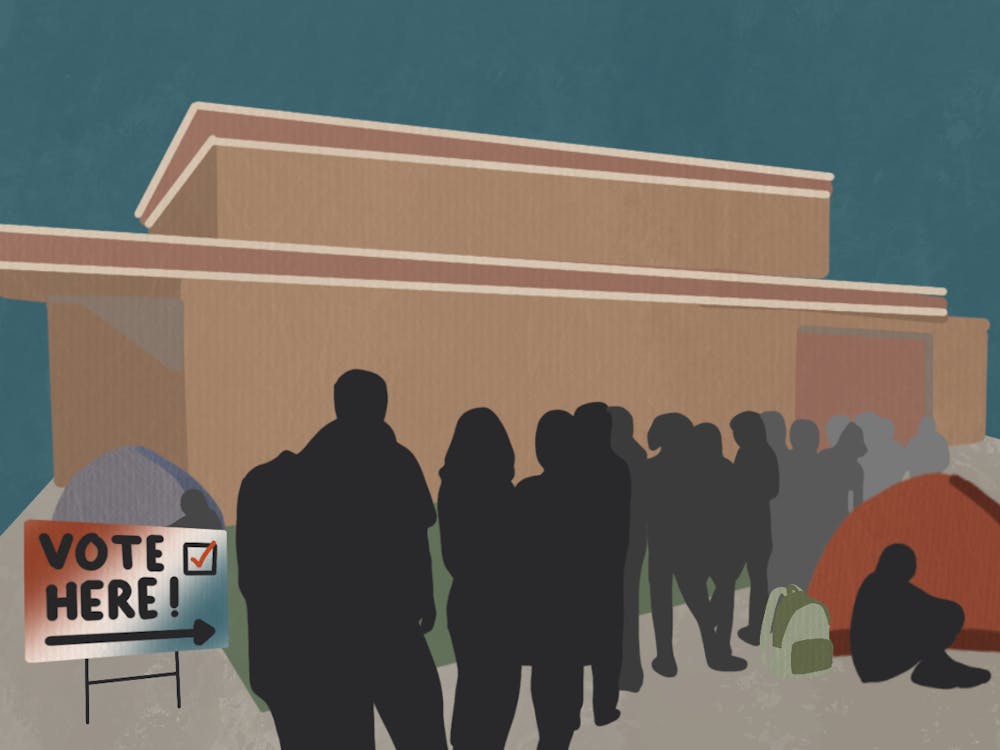Unhoused individuals often struggle with the hardships and stigma associated with homelessness, but stereotypes and unhoused status don’t mean they can’t exercise the right to vote. Yet many of them are still choosing not to.
Some unhoused individuals feel as though politicians say one thing but mean another, said Arthur Luke, a 69-year-old homeless Gainesville resident. He believes young people are being indoctrinated and don’t understand what they’re voting for.
Luke, who has three sons and said he’s been in Gainesville “too long,” is just one of the estimated 639 homeless people in Gainesville, according to the Alachua County 2024 count. While this election cycle is pivotal for many, many unhoused people remain uninclined to vote.
Luke doesn’t like politics, but would have voted for former president Donald Trump because he’s “not a bad guy,” he said.
“We gotta work for all [people], not just one," Luke said.
Legislation targeting the homeless
Several homeless encampments were shut down after House Bill 1365 went into effect on Oct. 1. Signed into law by Gov. Ron DeSantis in March, the bill seeks to prevent city and county governments from allowing people to sleep in public.
Earlier this year, unhoused individuals near Gainesville’s Southeast Fourth Place were given a five-hour timeframe to leave the sidewalk they had lived on for months, The Alligator previously reported. For the unhoused like Luke, policies like HB 1365 only solidify their mistrust of the government.
Homeless people often lack support and are forgotten by politicians, Luke said, noting that many homeless people like him are just tired of “that bullsh*t.”
Besides politics, homeless individuals also struggle to feel comfortable with other government-sponsored fields.
Ali Morrison is a volunteer at Heart for the Homeless Gainesville, a chapter of an international non-profit organization providing clinical outreach and free heart screenings to homeless people.
Morrison, a 21-year-old UF applied physiology and kinesiology senior, said many unhoused individuals mistrust the healthcare system. This bleeds into mistrust of the government, leading to voter apathy, Morrison said.
Morrison has spoken to many homeless people who have had traumatic experiences with the medical field and said many feel wronged, forgotten or hurt. Yet helping homeless individuals establish a little more faith in the healthcare system will gradually lead them to establish faith in the government, Morrison said.
“They probably actually have to do a lot more work to survive than a lot of us do,” Morrison said. “I think it's very easy to forget when you come from a lot of privilege that we were given such a far head start.”
Getting the unhoused to vote
Gainesville Mayor Harvey Ward said a lot of homeless people don't feel comfortable with institutional processes like voting — it's not first on the list for most people who are sleeping in a tent, he said.
Similarly, many unhoused people have felony records and probably don't have the resources to have their rights restored, Ward said.
In a 2018 report by the National Low Income Housing Coalition, “formerly incarcerated people are nearly 10 times more likely to be homeless than the general public.” Another report by prisonpolicy.org found that rates of homelessness are especially high for women and people of color.
While Ward acknowledged the difficulties unhoused people face, he also said there were resources readily available within the community, such as reaching out to Alachua County’s Supervisor of Elections office.
“It's pretty possible for anybody who is registered to vote and knows there's an election to be able to get it done,” Ward said.
Aaron Klein, the Director of Communications and Outreach for Vote Alachua, encouraged unhoused individuals to call or visit the website VoteAlachua.gov. The website outlines how to register to vote, update registration information and check polling places.
“We want to make sure we have only eligible voters in the voter rolls,” Klein said. “But we also want to make sure that we're not violating anyone's due process to being eligible to vote.”
All that’s required to vote for unhoused individuals is a form of identification and a mailing address, which can be a local shelter, according to vote.gov. Other addresses that can be used include a nearby religious center, a P.O. box at a local post office or the home address of a friend or family member who lives nearby.
For those without a driver's license, state IDs can be issued at a local DMV office. Resources are available for unhoused individuals to get any ID costs waived if needed.
Beyond Gainesville, other Florida-based organizations focused on politics and policies are making it a point to reach the unhoused and get people registered to vote.
“That's a community we always keep in mind when it comes to protecting marginalized Floridians,” said Cameron Driggers, the executive director of the Florida Youth Action Fund, a progressive, statewide organization dedicated to providing all Floridians with better resources and education.
Driggers, a 19-year-old UF business administration sophomore, said Youth Action Fund has been able to canvas homeless shelters about amendments on Florida’s ballot and the presidential election coming Nov. 5.
Two amendments that have been a focal point in media coverage include Amendment 3, which would allow adults to possess recreational marijuana products, and Amendment 4, which would legalize abortion to fetal viability, or about 24 weeks.
“A lot of these folks struggle to get back on their feet and to get out of the epidemic of homelessness because our state criminalizes…trivial things like marijuana use,” Driggers said.
Contact Vivienne Serret at vserret@alligator.org. Follow her on X @vivienneserret.
Vivienne Serret is a UF journalism and criminology senior, serving as the Fall 2024 race and equity reporter for The Alligator's Enterprise desk. She previously worked as a columnist and previously reported for The Alligator's university desk as the student government reporter. She loves karaoke and lifting at the gym.






